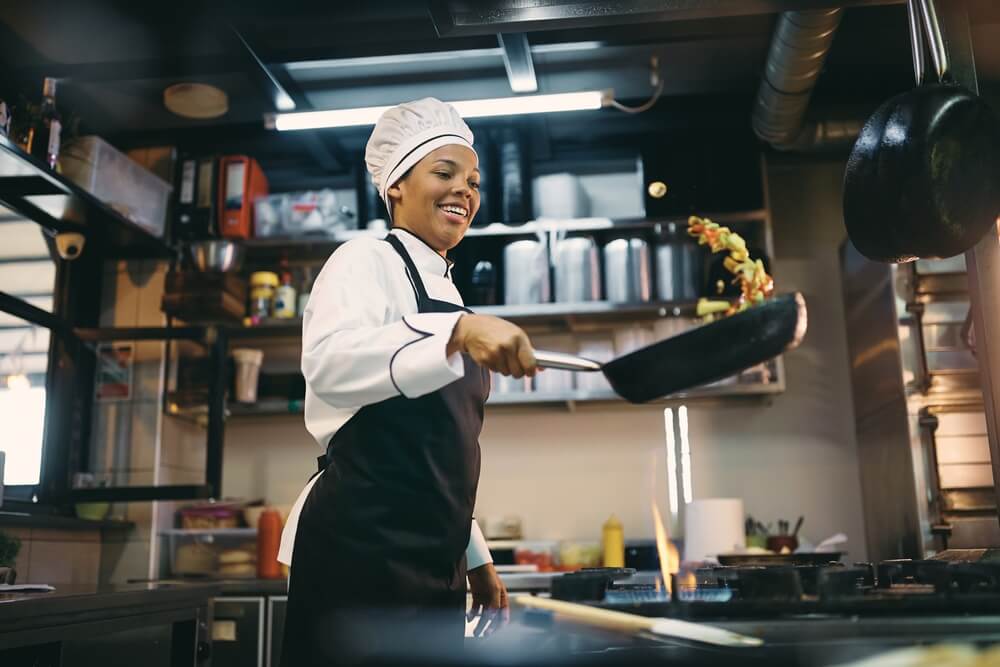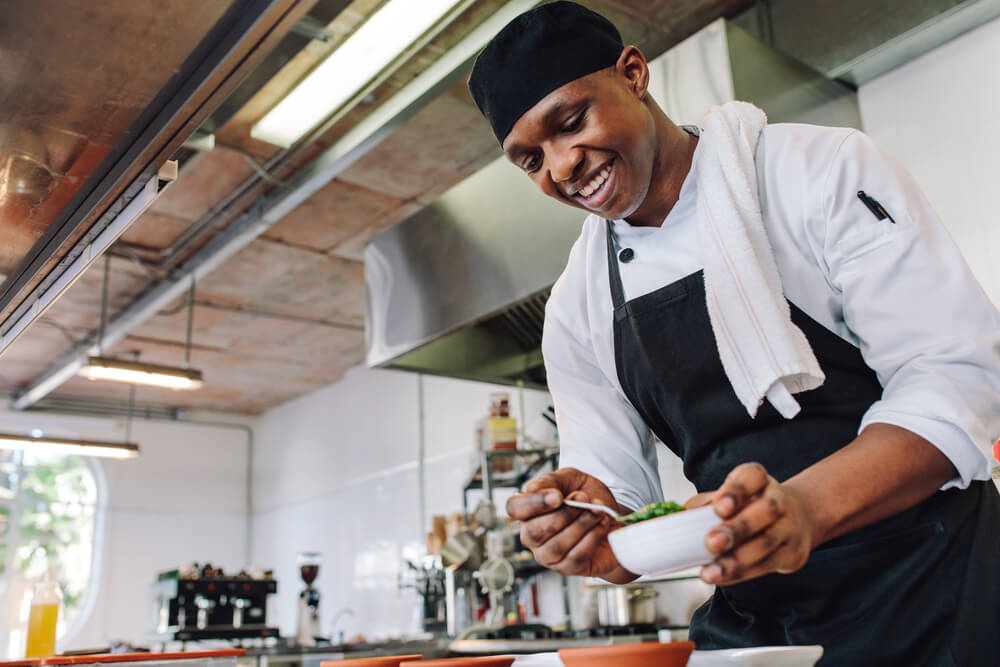What is a Chef?
As a chef, you will be responsible for preparing, cooking and plating meals for guests or customers in a variety of settings.
Typical settings where you will work include restaurants, pubs, hotel restaurants, cruise ships and contact catering. Your role will be varied depending on this setting, as well as your job title. You can either work as part of a team or solely by yourself. It’s an extremely demanding job and you will need personal and professional commitment in order to succeed.
You can work at the following levels:
- Junior chef
- Chef de partie
- Sous chef
- Head chef
Responsibilities
The responsibilities of a chef in a restaurant kitchen include the following:
- Setting up the kitchen with cooking equipment
- Studying each recipe and gathering all the necessary ingredients
- Cooking food in a timely manner
- Delegating tasks to kitchen staff
- Informing wait staff about daily specials
- Ensuring appealing plate presentation
- Supervising cooks and assisting as needed
- Sometimes modifying recipes to meet customers’ needs and requests
- Monitoring food stock and placing orders
- Checking the freshness of food and discarding out-of-date items
- Experimenting with recipes and suggesting new ingredients
- Ensuring you’re sticking with all health and safety regulations within the kitchen area

Salary
For entry-level chef roles, you can expect to earn between £12,000 to £16,000. As you become more experienced your salary can increase to around £20,000 to £30,000.
Head chefs will earn considerably more, between £25,000 to £55,000+. Your salary will depend on the role, setting and location. Those who work in high-end restaurants can expect to earn more than a contracted chef. In the same instance, a chef who works at a fast-food restaurant will earn less than one that works in fine dining or on a cruise ship. In general settings such as a small restaurant, you might be referred to as a general chef. According to Glassdoor, the national average salary for a chef is £22,921.
Hours
Your hours will flex depending on the setting, role and organisation. You may be required to work mornings, lunchtimes and evenings. You will often be required to work weekends and bank holidays. The standard working week is around 40 hours. Most chef roles will require you to work full-time. However, many roles do abide by the working time directive, which means you will not be required to work more than 48 hours per week. Although, if you would like to work more hours, you can opt-out.
What to expect
- The traditional uniform is chef whites, and wearing a hat and apron is standard
- Hygiene, health, and safety are essential
- Working long hours and being on your feet for extended periods of time
- Working in a humid, fast-paced environment
- Achieving work/life balance may be difficult
- Opportunity to travel around and learn about different cuisines
- French cuisine has a significant influence in the industry, particularly in haute cuisine
- Provides a varied working style and the opportunity to learn and progress.
Qualifications
A degree isn’t necessary to become a chef. However, some knowledge of the food industry, such as a foundation degree or degree in professional cookery or culinary arts will show that you have some experience, knowledge and skills.
You can also seek a placement which will give you real-life industry experience. Some restaurants will offer opportunities to shadow chefs and work as an assistant to help prepare. This is particularly common within busy settings. While you are working as a chef you may want to further your knowledge by taking additional courses in areas such as nutrition and food development.
Skills
must have skills:
- Technical skills and cooking techniques (cooking, storing, and serving food)
- Self-motivation
- Flexibility
- Teamwork and communication skills
- Willingness to learn and take instructions
- Organisational skills and delegation ability
- Attention to detail to ensure high standards
- Commitment and loyalty
- A hard-working and calm approach
- Ability to work without supervision.
- Language skills are also valuable, particularly French or Spanish.
Work experience
It is possible to find casual, part-time or weekend work as a chef which may be useful to do if you are studying and want to gain some industry experience.
This can either be in a pub, restaurant or reputable kitchen. Here you will learn the basics and you will learn from people who are experienced to boost your skillset. Having this work experience will help enhance your application.
Employers
Job opportunities can be found in:
- Chain restaurants
- Michelin-starred and AA Rosette-awarded restaurants
- Pubs and gastropubs
- Educational settings (schools, colleges, universities)
- The NHS
- The armed forces
- Contract catering
- Cruise ships
- Hotel or bar restaurants.
Professional development
Training opportunities are rare, but this will depend on the setting and the organisation. If you are working for a large chain restaurant or contract catering company, they will usually offer a structured training programme. However, independent companies such as pubs and restaurants are more likely to offer on-the-job training.
You will most likely learn by changing between different settings and it’s common for chefs to work in various kitchens throughout their careers. You may be required to travel or even relocate to access the opportunities for professional growth.
If you pursue additional education such as an undergraduate or Master’s degree, you may qualify to work as a nutritionist or dietitian. Alternatively, you could opt to become a food technology/cookery teacher or assessor by undergoing training and working for a college or training provider. Experienced chefs should have a wealth of knowledge when it comes to food, leadership and budgeting. To become a head chef, personal and professional commitment is required.
- Chef manager
- The general manager or restaurant manager
- Food or product development
- Food and beverage director
- Head of catering or catering manager
- Food writer or blogger
- Restaurant owner.
Related Courses
- BA(Hons) Culinary Arts





